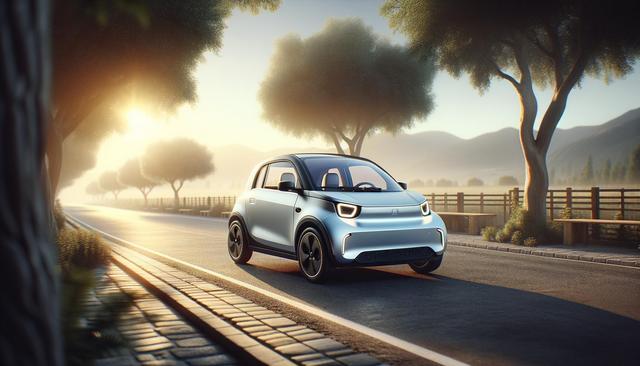Urban Mobility Challenges and the Rise of Compact EVs
Cities around the world are becoming more congested, and traffic remains a key issue for urban residents. In this context, small electric cars offer a practical solution. Their compact size makes them ideal for navigating narrow streets, finding parking in tight spots, and reducing road clutter. These vehicles are designed with urban life in mind, where shorter commutes and lower speed limits make large vehicles unnecessary. As a result, more drivers are opting for compact electric vehicles (EVs) as a way to address everyday transportation needs more efficiently.
Another advantage is their agility in stop-and-go traffic. Smaller electric cars, with lighter frames and simplified drivetrains, respond well in crowded environments. Their electric motors provide instant torque, which contributes to smooth acceleration in busy city driving conditions. With fewer components than internal combustion engines, these vehicles also tend to require less maintenance, which is another appealing factor for urban dwellers who rely on their cars for daily use.
Environmental Benefits in Densely Populated Areas
Air pollution is a growing concern in metropolitan areas, and small electric cars are helping to address this issue. By producing zero tailpipe emissions, these vehicles contribute to cleaner air and a healthier environment. This is particularly important in cities where high population density and heavy traffic can lead to elevated levels of pollutants like nitrogen dioxide and particulate matter.
In addition to improving air quality, compact EVs also support broader sustainability goals. Many cities are investing in green infrastructure, such as dedicated EV parking zones and charging stations, to encourage the adoption of low-emission vehicles. By aligning with these initiatives, drivers of small electric cars are not only making an environmentally conscious choice but also benefiting from incentives such as reduced tolls, priority lanes, and tax rebates. These benefits make EV ownership more attractive and accessible to a wider audience.
Affordability and Lower Operating Costs
Cost is often a significant factor when choosing a vehicle, and small electric cars tend to be more affordable than their larger counterparts. Their compact design requires fewer materials, and manufacturers often position them as entry-level models within their electric vehicle lineup. This makes them a feasible option for budget-conscious individuals, students, and first-time car buyers living in urban settings.
Beyond the purchase price, the ongoing operating costs are generally lower. Charging a small EV typically costs less than fueling a gasoline-powered car, especially when using home charging solutions. Additional financial advantages include:
- Fewer mechanical parts, resulting in reduced maintenance expenses
- Lower registration fees in some regions
- Eligibility for government subsidies or rebates
These factors combine to create a cost-effective ownership experience, which is particularly valuable for people who use their vehicle primarily for short, daily commutes.
Technological Advancements and Urban Integration
Technological innovation is playing a crucial role in the evolution of small electric cars. Many of today’s compact EVs come equipped with features like regenerative braking, smart navigation systems, and app-based connectivity. These enhancements not only improve the driving experience but also help drivers manage their energy usage more effectively. As cities become more connected, these vehicles are increasingly integrated into urban mobility ecosystems.
For example, some compact EVs are now compatible with car-sharing platforms and ride-hailing services. Their size and efficiency make them ideal for short-term rentals and quick trips, reducing the need for private vehicle ownership. Furthermore, urban planners are beginning to recognize the role these vehicles can play in reducing traffic congestion and optimizing public space. This has led to new policies that support EV adoption, such as:
- Expanded charging infrastructure in residential and public areas
- Dedicated EV-only zones in city centers
- Partnerships between municipalities and mobility service providers
With these developments, small electric cars are becoming a key component of modern urban living.
Changing Attitudes and Lifestyle Shifts
The growing popularity of small electric cars is also being driven by changing consumer attitudes. Younger generations, in particular, are placing greater emphasis on sustainability, efficiency, and convenience. Owning a smaller, eco-friendly vehicle aligns with these values while also offering flexibility in daily life. Many urban residents are moving away from traditional car ownership models and embracing shared transportation or owning compact vehicles for occasional use.
In addition, the minimalist lifestyle trend has encouraged people to downsize in many areas of their lives, including transportation. Small electric cars fit well with this movement, offering the essentials for urban travel without the excess. As people prioritize experiences over possessions, the appeal of a low-maintenance, environmentally responsible vehicle continues to grow.
Moreover, the design of modern compact EVs often reflects a thoughtful balance between form and function. They are built to maximize interior space while maintaining a small footprint, making them comfortable yet practical. This has helped shift the perception of small cars from being merely economical to being smart and stylish transportation solutions for modern city life.
Conclusion: A Smart Choice for Urban Living
As cities aim to become more sustainable, livable, and efficient, small electric cars offer a compelling transportation option. Their practicality in urban settings, combined with environmental benefits and cost savings, make them an increasingly popular choice among city dwellers. Whether for daily commutes, short errands, or shared mobility services, compact EVs are shaping the future of urban transportation by providing a cleaner, more convenient way to navigate city life.




Leave a Reply